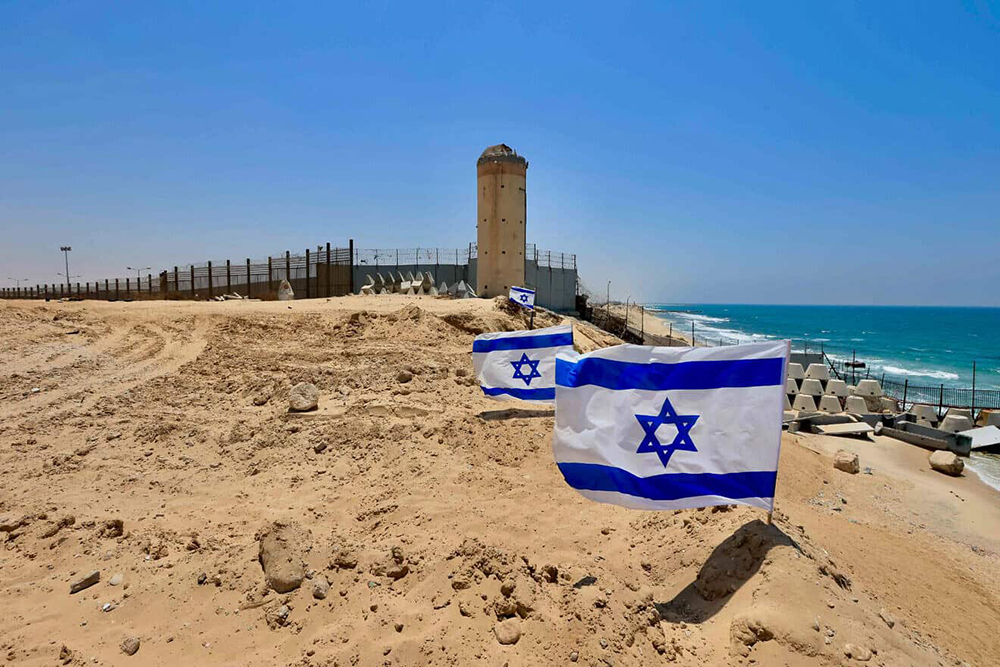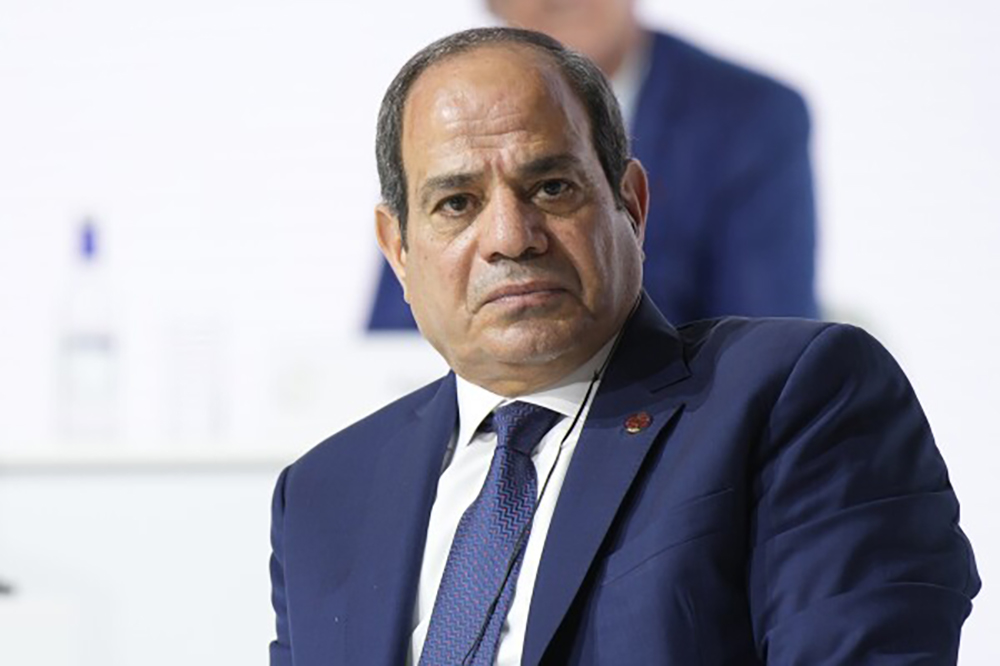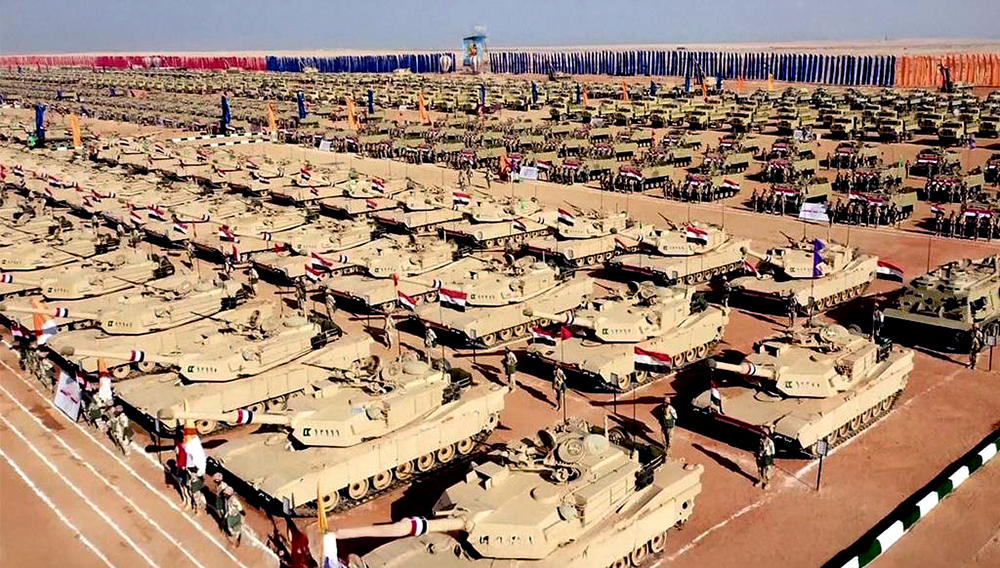|
Getting your Trinity Audio player ready...
|
Edited by: TJVNews.com
Israeli Ambassador to the United States, Yechiel Leiter, has publicly accused Egypt of “very serious” violations of its 45-year-old peace treaty with Israel, citing an alarming military buildup in the Sinai Peninsula. According to a report on Sunday on the Jewish News Syndicate website, the Israeli government is poised to raise this issue with Cairo in the near future, as growing security concerns mount regarding Egypt’s military presence near the Israeli border.
During his first meeting with American Jewish organizations on January 28, Leiter outlined how Egypt has established military bases in Sinai that serve “only for offensive operations,” a direct breach of the 1979 peace treaty between the two countries. As reported by JNS, a recording of this speech was later shared online by the Conference of Presidents of Major American Jewish Organizations. In his remarks, Leiter emphasized the gravity of the situation, stating, “For a long time, it’s been shunted aside, and this continues. This is going to be an issue that we’re going to put on the table very soon and very emphatically.”
JNS further reported that satellite imagery has revealed significant changes in Egyptian military deployments in Sinai, causing deep concern among Israeli security officials. IDF Lt. Col. (res.) Eliyahu Dekel, a long-time monitor of Egypt’s adherence to the peace treaty, recently noted that if the latest intelligence is confirmed, Egypt is far exceeding its permitted military presence in the region. He explained that while the treaty allows for military encampments for 47 battalions, the reality on the ground suggests there are currently around 180 battalions—nearly four times the permitted amount.
Moreover, the JNS report highlighted specific military developments that are raising alarm. Egypt has reportedly deployed its most advanced Abrams battle tanks—typically reserved for elite units—into Sinai, further fueling Israeli concerns. The construction of three new airfields and extensive tunnel networks in the area have also been cited as blatant treaty violations.
While these military developments have strained relations between Jerusalem and Cairo, Egypt’s political rhetoric has also escalated in recent days, according to JNS. Egyptian President Abdel Fattah el-Sisi has vehemently opposed any plan to relocate Palestinians from Gaza, in direct response to President Trump’s proposal for potential resettlement. His strong opposition has even led to the postponement of a planned visit to the White House, reinforcing the growing diplomatic friction between Egypt and the United States.

Ambassador Leiter provided additional geopolitical context during his speech, asserting that Sisi is navigating a complex political landscape. JNS reported that he noted that Egypt’s leader “plays both sides of the equation” but remains vulnerable to internal threats from the Muslim Brotherhood. Leiter argued that if the Israeli military successfully eradicates Hamas—the Brotherhood’s Palestinian branch—Sisi may become “more open to cooperate with us on the ‘day after’ Hamas.”
However, JNS has also reported that despite Egypt’s firm stance against Palestinian resettlement, Israeli officials have criticized contradictions in Sisi’s approach. Leiter condemned Egypt’s refusal to even temporarily host Palestinian refugees, particularly given reports that members of Sisi’s own family are profiting from Gazans seeking to leave the enclave. According to the information provided in the JNS report, these individuals have allegedly been operating a travel agency that charges thousands of dollars for facilitating Gazans’ exit from the region.
On Sunday, JNS detailed how Sisi reiterated his position during a meeting with World Jewish Congress President Ronald Lauder. The Egyptian leader maintained that the only sustainable solution for regional stability is the establishment of a Palestinian state within Judea, Samaria, and Gaza. A statement from Sisi’s office, as cited by JNS, emphasized the need for reconstructing the war-torn Gaza Strip “without displacing its residents from their land.”
Despite these tensions, JNS has reported that Lauder praised Egypt’s “wise efforts” in promoting regional stability. However, Israel’s growing concerns over Cairo’s military maneuvers in Sinai are expected to take center stage in upcoming diplomatic engagements. With Jerusalem preparing to address this issue “very emphatically,” as Ambassador Leiter stated, the future of Israeli-Egyptian relations appears increasingly uncertain.
For several days, videos circulating on social media have shown an increased Egyptian military presence in the Sinai Peninsula near the borders of Israel, Gaza, and Egypt. Deutsche Welle, (a German public, state-owned international broadcaster funded by the German federal tax budget), reported on Tuesday that these troop movements, captured in various Arabic-language and Israeli media sources, have sparked speculation about Egypt’s intentions.
Egypt’s growing military presence in Sinai has raised concerns in both Israeli and Palestinian circles, with some analysts suggesting it signals Cairo’s preparation for potential conflict. However, as DW has reported, Egypt, along with the U.S. and Qatar, has played a crucial role in brokering the current ceasefire between Israel and Hamas following the brutal October 7, 2023, terrorist attack on Israel, which left 1,200 Israeli civilians and others dead. In response, Israel launched a retaliatory military operation against the Iranian-backed Hamas terror organization in Gaza, leading to ongoing discussions about reconstruction efforts under a fragile ceasefire.

According to the information provided in the Deutsche Welle report, both Jordan and Egypt have categorically rejected any plans to absorb millions of Palestinian refugees from Gaza, viewing such a scenario as an existential crisis that could destabilize their nations. Furthermore, the report indicated that the international community could see such a forced displacement as ethnic cleansing, compounding tensions in the region.
Despite the ominous appearance of Egyptian military reinforcements near its border with Israel, claims that Cairo is preparing for armed conflict to block a Palestinian exodus from Gaza are misleading, according to experts cited by Deutche Welle. Hossam el-Hamalawy, an Egyptian researcher and activist based in Germany who specializes in security and political affairs, has dismissed the notion that Egypt would unilaterally deploy forces into Sinai.
“The Egyptian army cannot send a single tank, even a single officer, into Sinai without prior Israeli permission,” el-Hamalawy explained to Deutche Welle. He also noted that the Multinational Force and Observers (MFO)—an international peacekeeping organization established under the 1979 Egypt-Israel peace treaty—must also be consulted before any such military deployment occurs.
As Deutsche Welle reported, the MFO comprises approximately 1,100 soldiers, nearly half of whom are American, and is jointly funded by Egypt, Israel, and the U.S. In response to DW’s inquiries regarding Egyptian troop movements, the MFO declined to comment, stating that its findings are confidential and shared only with Egypt and Israel.
The speculation regarding Egypt’s military buildup was fueled by media reports highlighting a video taken in early February, which showed a convoy of roughly a dozen Egyptian tanks near the border with Israel and Gaza. While the footage has been widely circulated, the report at Deutsche Welle has noted that confirming exact troop numbers remains difficult. Additionally, older press photos suggest that Egyptian military vehicles have been stationed in similar areas in Sinai over the past year, indicating that recent movements may not be as unusual as some reports imply.
The Sinai Foundation for Human Rights (SFHR), a London-based advocacy group with contacts on the ground in Sinai, has also observed changes in Egypt’s military posture. However, as SFHR director Ahmed Salem told Deutsche Welle, these modifications have been relatively minor and have mostly involved infrastructure development in central Sinai rather than significant troop reinforcements near the border.
Egypt’s position reflects broader geopolitical considerations, as Deutsche Welle has noted. On one hand, Cairo has maintained its role as a mediator in the Israeli-Palestinian conflict, but on the other, it remains wary of any developments that could embolden extremist groups or destabilize the region. El-Sisi’s government is particularly sensitive to the threat posed by terrorist groups operating in Sinai, and any major shift in the area’s security dynamics could have significant consequences.
A key area of focus in these military deployments is the Philadelphi corridor, a narrow strip of land running along the Gaza-Egypt border. Previously, this corridor was managed by Egypt under an agreement with Israel made in 2005. The corridor, which includes the Rafah crossing—the only entry and exit point between Gaza and Egypt—has long been a strategic area for both nations. However, Deutsche Welle reported that in late 2023, during Israel’s military campaign in Gaza, Israel took control of the Philadelphi corridor, despite Egyptian objections.

The move sparked tensions between the two countries, as Egypt has historically opposed any heavy Israeli military presence near its border. According to Aboudouh of Chatham House, Egypt’s recent military movements, including the deployment of tanks, may be a response to Israel’s growing presence along the Philadelphi corridor. “The tanks may also be there to balance Israel’s belligerent and heavy deployments along the Philadelphi corridor,” Aboudouh suggested. This shift in control has exacerbated Egypt’s concerns about Israeli military activities so close to its border, further intensifying Egypt’s efforts to ensure regional stability and counter extremist forces.
Egypt’s military deployments in Sinai are not a new phenomenon, and according to Deutsche Welle, they have escalated over time in response to regional threats, including terrorist activity. In 2018, Egypt received Israeli permission to significantly increase its military presence in Sinai to combat terrorist groups operating in the region. Deutsche Welle also reported that Egypt’s forces in Sinai doubled that year, from 25,000 men in 41 battalions to 42,000 men in 88 battalions. Additionally, Egypt constructed more permanent military bases, which are still operational today.
In 2021, Egypt and Israel further agreed on an expanded Egyptian troop presence in Sinai, including near the border, a move that was officially outside the framework of their 1979 peace treaty. As reported by DW, this understanding allowed Egypt to bolster its forces in the region, particularly as it confronted threats from terrorist groups. These agreements also saw Egypt permitting Israel to conduct air strikes in Sinai to target terrorists, with Israel eventually carrying out around 100 air strikes.
However, as Ahmed Salem of the SFHR pointed out in Deutsche Welle’s coverage, both Egypt and Israel have regularly exceeded their permitted military deployments in Sinai. The Multinational Force and Observers (MFO), which monitors the peace treaty’s security provisions, frequently cites both nations for breaches. Despite this, Salem does not believe that Egypt is preparing for war. In fact, he argues that the growing military presence in Sinai is more likely an attempt to manage the evolving security situation, rather than any aggressive posturing. “That’s a huge exaggeration that I believe is being used to put more pressure on Egypt,” he told Deutsche Welle.
According to Deutsche Welle, reports of Egyptian military movements in Sinai have been leveraged by both Egyptian and Israeli leadership for domestic and regional political purposes. For Egyptian President Abdel Fattah el-Sisi, the narrative of a military buildup allows him to present himself as a strong leader who is defending Egyptian sovereignty and standing in solidarity with Palestinians in Gaza. This portrayal strengthens his position domestically and within the broader Arab world, especially as Egypt has repeatedly opposed proposals that would involve resettling Palestinians in Sinai as part of U.S.-backed reconstruction efforts in Gaza.
In Israel, the reports serve a different function. As the Deutsche Welle report explained, Israeli politicians have used Egypt’s military activity to apply pressure on Cairo regarding the controversial “Gaza Riviera” plan, which envisions turning parts of Gaza into a developed, tourism-friendly coastal region. Additionally, highlighting Egypt’s ongoing military modernization and expansion allows Israeli officials to frame Egypt’s growing capabilities as a potential security concern, adding weight to their calls for continued vigilance regarding their southern neighbor.
Despite the strong rhetoric circulating on social media and in political discourse, experts cited by Deutsche Welle believe that both Egypt and Israel are more inclined to use diplomacy rather than military action to navigate these tensions. Ahmed Aboudouh told Deutsche Welle that regional Arab powers are focused on building a unified diplomatic front rather than escalating military tensions. “I think building a unified Arab front is the main goal now,” Aboudouh explained, referencing a scheduled meeting between Egypt, Saudi Arabia, the UAE, Qatar, and Jordan in Riyadh this week, as well as a broader summit planned for February 27.
Similarly, Ahmed Salem of the Sinai Foundation for Human Rights (SFHR) acknowledged to Deutsche Welle that while tensions exist, both nations have a range of diplomatic measures available before any serious military steps are taken. “When it comes to tensions between two countries, there are a lot of steps, diplomatic steps, that can be taken before the army is deployed,” Salem said.
Further evidence that Egypt and Israel are maintaining their usual working relationship can be found in economic developments between the two countries. As Deutsche Welle reported, independent analyst Hossam el-Hamalawy has pointed out that despite the political rhetoric, economic cooperation continues without disruption. On Monday morning, an Arabic-language business newspaper reported that Egypt is seeking to increase its natural gas imports from Israel by 58% by mid-2024. This significant economic arrangement highlights the reality that, beyond the political grandstanding, Egypt and Israel continue to maintain strong economic ties and shared strategic interests.





